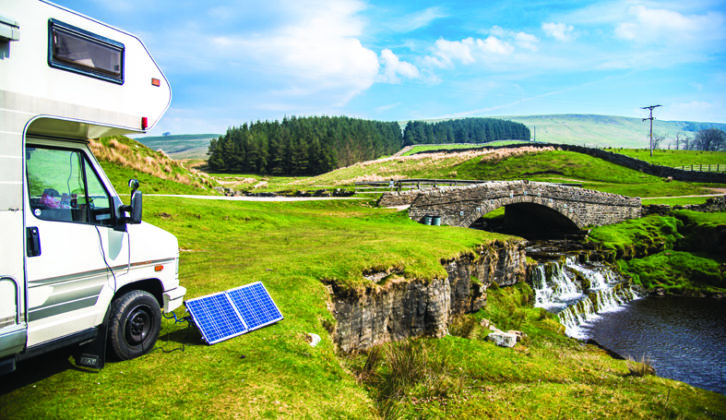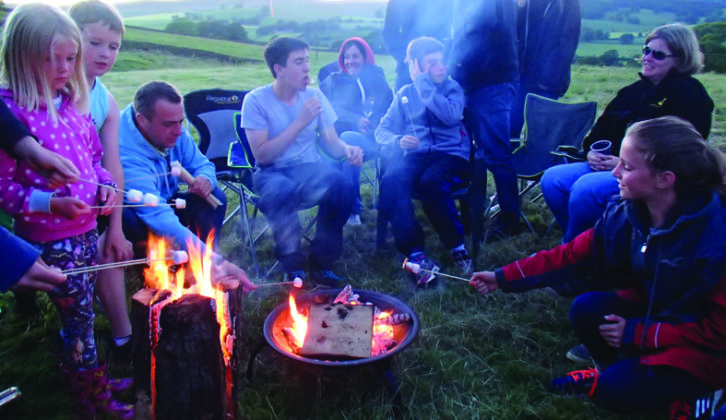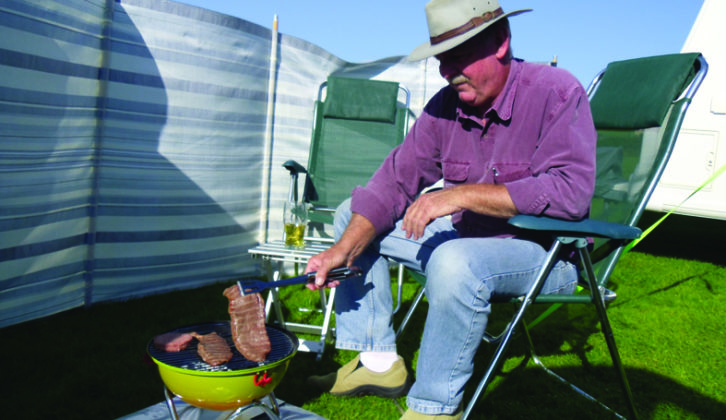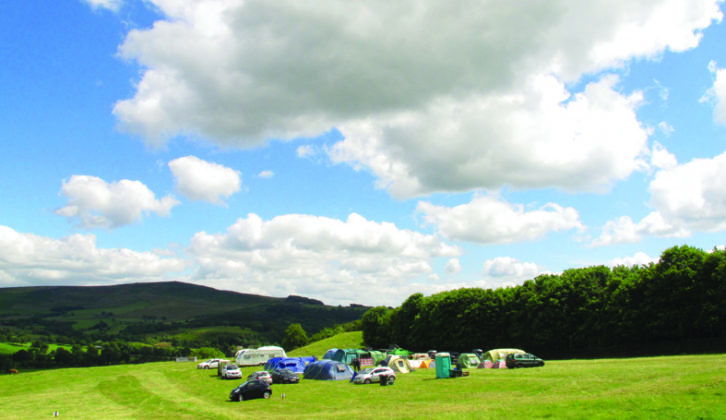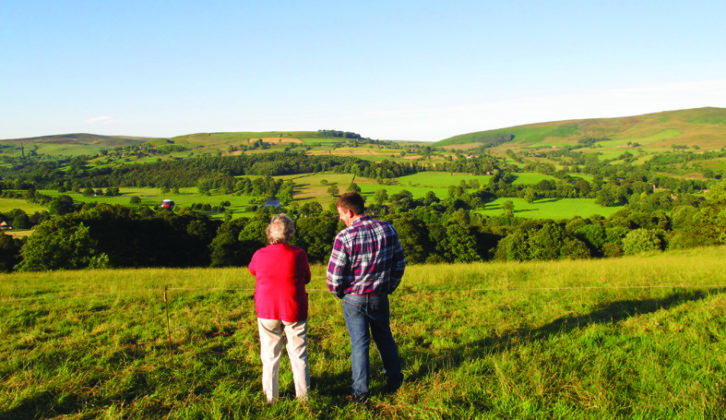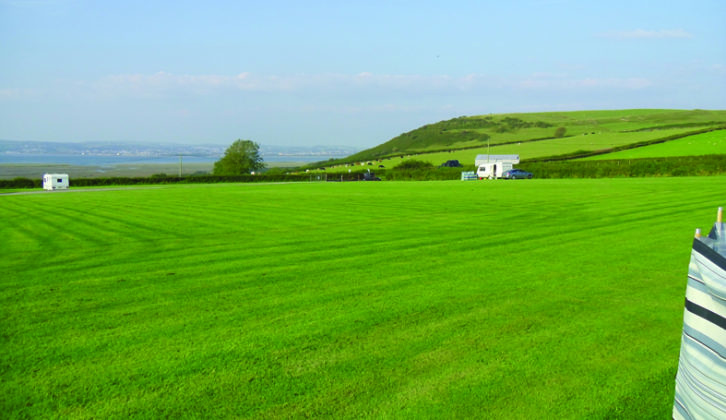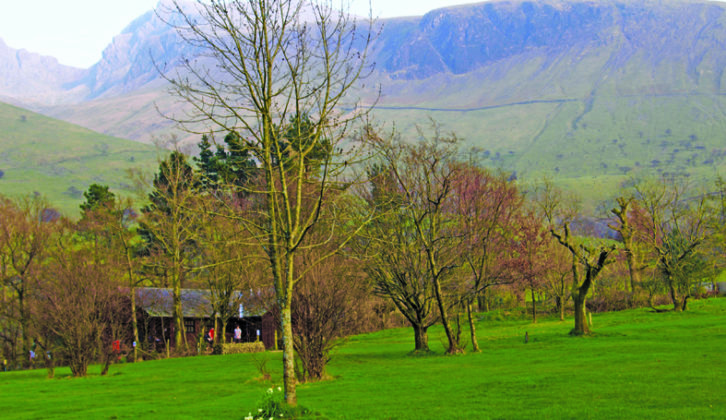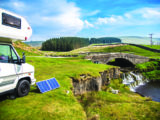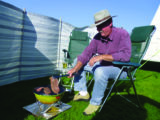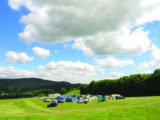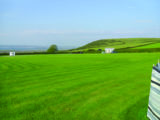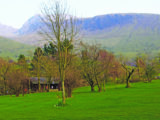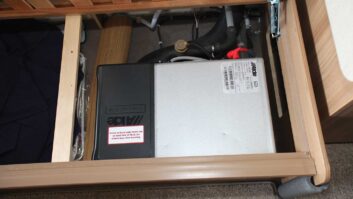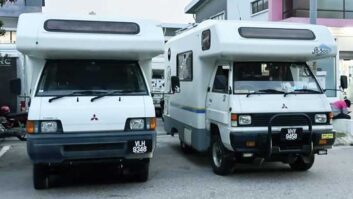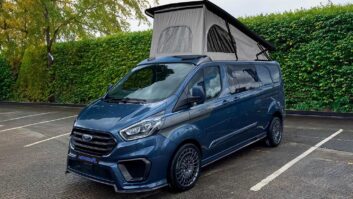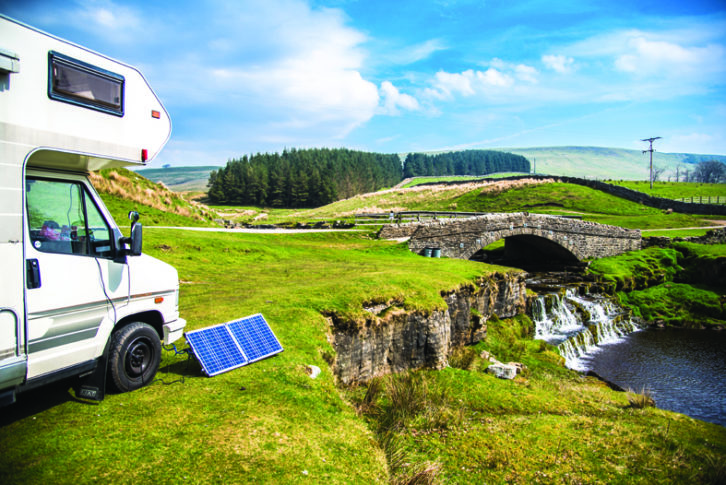
“I’m not tight, I just don’t like wasting money.” That’s what I tell my family as I dash around the house, switching off the lights or turning down the thermostat, with plenty of the sort of exaggerated huffing that could win me an Oscar if overacting were a category.
It’s similar in the motorhome when we go off-grid, but there it’s all about preserving battery power and gas, as I attempt to make both of these vital resources last as long as possible.
There’s a skill to off-gridding, which took me a little while to develop. But the effort was worth it, as I’ve stayed on some sensational facility-free sites over the years.
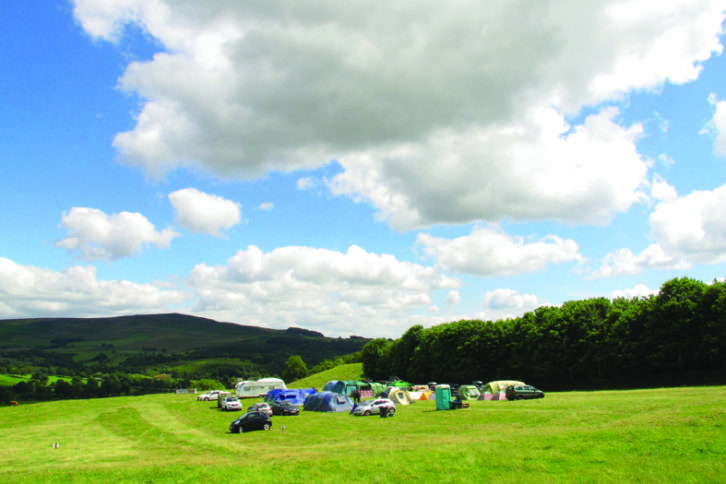
By definition, off-grid touring means you have no electric hook-up, Wi-Fi or those other luxuries we’ve come to expect. Most often, a lack of campsite facilities requires you to rely on your motorhome’s washroom, too.
The camping X-factor
The payback for these little ‘hardships’ is immense, however. The best off-grid sites (sometimes Club CSs and CLs) are small, wild and set in the most extraordinary locations, where a big, commercial campsite simply wouldn’t be allowed to operate.
Yes, you can save a small fortune in campsite fees, but it’s more to do with the quality of the sites. Usually rural and remote, they often have a camping X-factor that the bigger, facility-filled parks can’t compete with.
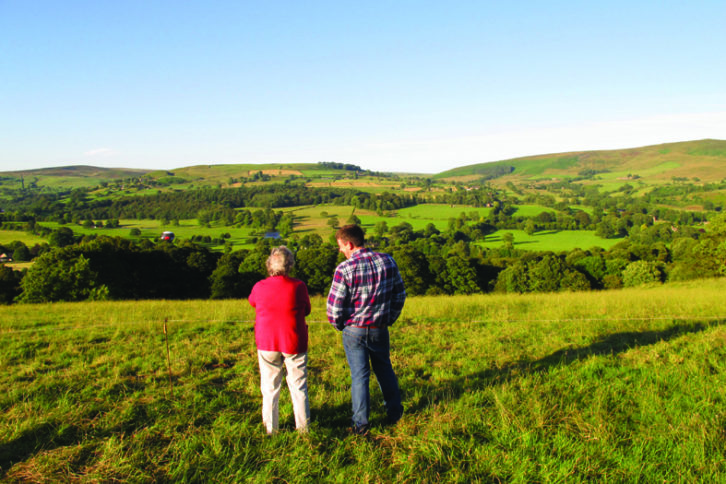
Importantly, off-gridding doesn’t have to mean roughing it – you can power your hob, oven, heating and fridge with gas, and lighting and TV with battery power. It’s really just the microwave and electric hotplate you’ll say au revoir to, for this trip at least.
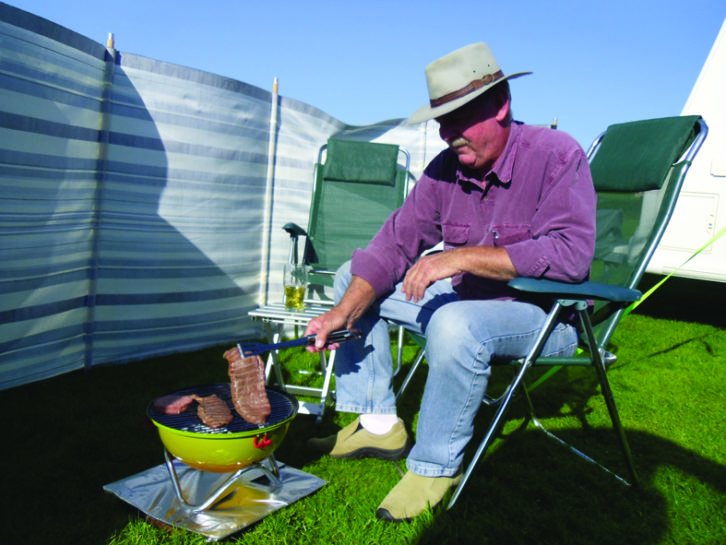
I have learned from my own personal experience that running out of gas or battery power does little to enhance a motorcaravanning holiday, so we’ve pulled together some top tips to make sure that your next off-grid trip is a complete success!
Gas
Ensure that you have sufficient gas for your outing. This could be a bit awkward without investing in a second gas cylinder, so that you’ve always got a full one.
You really don’t want to be swapping a third-full bottle for a full one with your Calor distributor.
One excellent solution to this quandary is to invest in a self-refill system such as Safefill or Gaslow. Both involve buying the bottle(s) – and in the case of Gaslow, the installation – which you can then fill up yourself at any of the UK’s 240 LPG Autogas fuel stations, such as Morrisons, for example. You can find out more at drivelpg.co.uk.
Not only can you then top up your cylinder at any time, but the gast costs significantly less. When we looked, Calor cost around £2 a litre, wile Autogas was just 60p a litre. If you can find a domestic gas supplier, you can also knock the VAT off that.
You have a choice of two tupes of bottled gas: butane or propane. One litre of butane contains 12% more energy than one litre of propane, but the most important difference for motorcaravanners is the minimum temperature at which they vaporise.
Butane vaporises at temperatures down to minus 2°C, while propane vaporises as low as minus 42°C. Touring in a typical British winter could easily cause a butane-powered system to stop working, while you’d have to be visiting Siberia to prevent a propane system from functioning.
Electricity
With no mains hook-up, you’re going to be relying on your leisure battery for all of your electric power. This is the main reason why many serious off-gridders will often install a second leisure battery, fitted with manual or automatic switchover.
The NCC has set up a Verified Leisure Battery Scheme, which offers motorcaravanners clear guidance on a battery’s capacity.
Category A batteries have higher storage capacity and are designed for those who tend to camp away from electric hook-up.
Category B batteries are for those who typically stay on pitches with an electric hook-up, but also need greater power for certain devices.
Category C batteries are designed for use over a short time to power basic, low-demand equipment.
Start by fitting the largest leisure battery that you can find, ideally one designated Category A.
Your battery power (reserve) is measured in ampere/hours (Ah), and an ideal size for off-gridders is 110Ah. This is a large item, so check it will fit in your leisure battery compartment. Bear in mind that a second battery can also take up 20kg of your payload allowance.
A leisure battery has much thicker lead plates inside than those provided in a car battery. Typically, the heavier a battery is, the more lead it contains and the better-suited it will be for off-grid motorcaravanning.
Avoid letting the charge in your lead-acid leisure battery become too depleted. It will last longer if it’s regularly recharged from 75% capacity, rather than letting it go down to 50% or below.
The latest lithium batteries are perfect for off-gridding. Lithium iron phosphate (LiFePO4) technology creates powerful and lightweight batteries that can be discharged much further than lead-acid batteries, with no detrimental effects.
Of course, there’s a downside, and in this case, it’s the price. A few years ago, lithium leisure batteries cost about £2000. Prices are now down to around £700, but that’s still many multiples of a good-quality standard battery.
The control panel in most motorhomes displays the level of charge remaining in the leisure battery. This might not always be the most accurate indicator so ask you technician to compare it with a voltmeter reading at service time.
Typically, a 12V battery is fully charged when the meter reads 12.7V, 75% charged when the display says 12.4V and 50% charged at 12.2V. This is the time to recharge it.
A long drive will bring the battery power back up, of course, but you could also use a charge if you’re not planning on going anywhere. A gentle trickle charge suits leisure batteries better than fast charging. Smart chargers (such as from CTEK, prevent overcharging, which can lessen a battery’s lifespan.
It’s important to keep batteries properly charged in the off-season and in storage. Use a smart charger where possible, or remove the leisure battery from the ‘van and store it in a well-ventilated room, checking its power levels periodically.
For best performance, it’s best to keep non-sealed batteries topped up with fluid, and to ensure the battery posts are clean and the clamps are fitted tightly.
Finally, remember leisure batteries are less efficient in cold conditions (their power figure is calculated at 25°C). As a rule, every 1°C fall below 25°C results in a 1% decline in the battery’s performance.
You could try…
Solar panels
Solar panels can keep your leisure battery topped up with power, so are perfect off-grid. Photovoltaic panels create electricity from all light, not just direct sunlight, so they will generate current in winter, albeit a fraction of what they’d make on a bright summer day.
They can be fixed to the roof (bonded or bolted on), or they’re available in portable metal frames, which can be moved around to make the best use of available sunlight. Remember to move them at night during the summer, so they can make the most of the early morning sunlight before you rise.
Buy a good brand from a reputable dealer. Look for a panel that displays the international IEC 61215 quality certification, and buy from a dealer which is offering a good warranty.
Solar Technology International, for example, has a 20-year performance warranty.
The angle of your panel hugely affects its performance. The optimum angle varies, depending on location and time of year. The best angles have been calculated and can be found online at solarelectricityhandbook.com.
All panels over 18W will require a voltage regulator/controller. We recommend buying a (slightly more expensive) Maximum Power Point Tracking charge controller, because these can eke out 20% more power from your system.
Aim to fit a panel that is capable of keeping your system charged; typically this will be a 100-200W set-up.
Your maximum charging rate will be the wattage of the panel multiplied by the hours of useful light. In summer, a 150W panel might get five hours of strong light, so 150W x 5 hours = 750W.
Watching TV for three hours might use 3 x 35W = 105Wh, and LEDs might consume 5 x 35W = 25Wh. The water pump and heating fan require much more power. You’ll get to know how many devices you can use.
You might find a cheap solar panel online, but the experts recommend buying from a recognised UK supplier. Investing a little but more on carefully sourced panels will pay dividends in power output, longevity and aftercare.
An AGM-type leisure battery is particularly efficient when used with a solar panel for topping up.
Solar panel contacts
Water
All but the most extreme off-grid sites will have a water supply, but we would still always recommend taking a large canister of drinking water with you just in case, especially when going to sites that you haven’t visited before.
Save power
You can take steps to limit the amount of power you use. A ‘van with LED lighting uses a fraction of the power consumed in one with traditional tungsten bulbs. LED light conversions are a relatively easy job for the keen DIYer. Likewise, modern LED TVs consume less power than other types.
Avoid activating your water pump every time you turn on a tap to wash your hands, by taking a bottle of hand sanitiser. This saves water, too.
Hot summer days often lead to cool evenings. Rather than flicking on the heating, consider taking ‘unseasonal’ clothing along, such as bedscoks, for when you are indoors.
Alternatively, you could take a firepit along with you (if the site allows them), and then everyone can sit outside later in the evening. Shower in the morning, so the battery has all day to recharge via solar power.
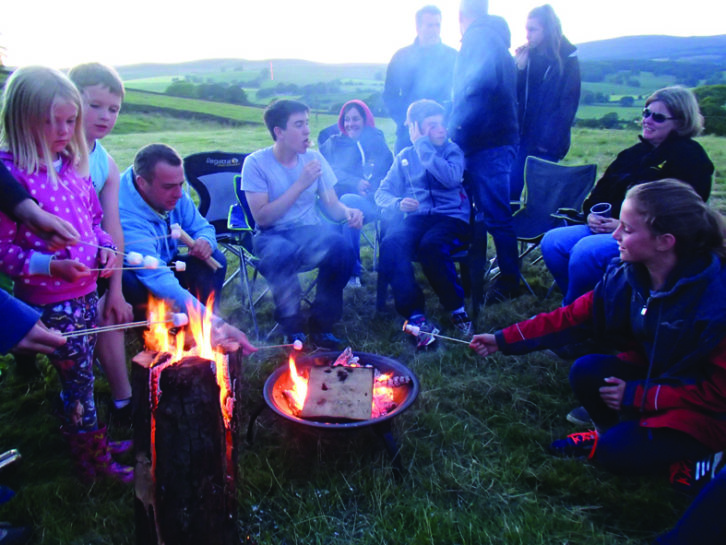
Powered by 12V
Lots of electrical appliances that would be powered by 240V mains electricity at home are available in 12V versions, and these are perfect for off-grid fans. For example, 12V kettles, toasters and hairdryers can be obtained from all good touring dealerships.
Inverters
Inverters turn 12V DC battery power into a 230V AC output. This allows you to run household appliances in your motorhome when you are off-grid. There are two types of inverter-quasi (or modified) sine wave inverters and pure sine wave inverters.
Quasi versions will power most appliances, including microwaves, kettles, hairdryers and straighteners, but some thyristor-controlled equipment can only be run from a pure sine wave inverter.
Calculate the maximum power consumption you’ll need (in watts) and choose an inverter accordingly.
Remember that an inverter typically discharges your battery much faster than when using 12V equipment.
Save money
A typical night rate at a mainstream campsite is around £25. A top-notch small site with fewer facilities and no hook-up costs £10-£12 per night; sometimes as little as £8. Both types will probably offer guests discounts for a week-long booking, so the totals might typically be £150 versus £65.
SITES WITH PITCHES FOR £20 AND UNDER
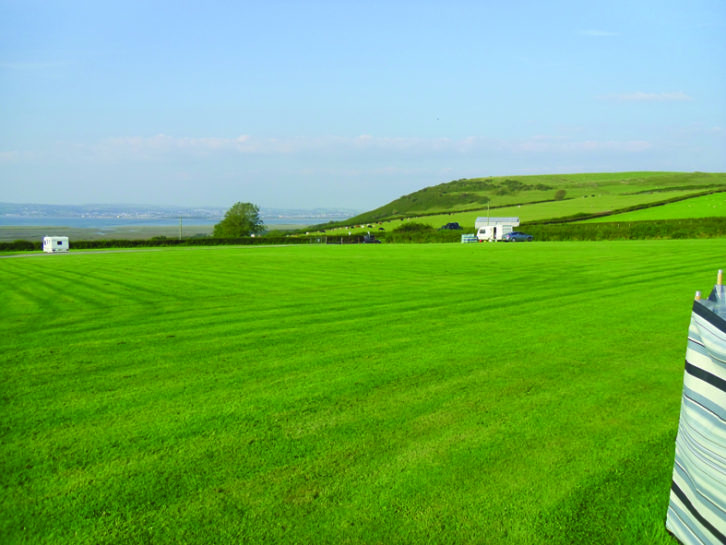
Whitehall Farm CS
- Lusk Road, Caerleon, Newport, Monmouthshire, NP18 1LP
- Tel 01633 421927
- Web campingandcaravanningclub.co.uk
- Prices From £12 per night
Ashleigh Lakes
- 45 Broadgate, Whaplode Drive, Spalding, Lincolnshire, PE12 0TN
- Tel 01406 330 666
- Web ashleighlakes.co.uk
- Prices From £15 per night
Becks Bay Camping
- Penally, Tenby, Pembrokeshire, SA70 7RX
- Tel 01834 501 871
- Web becksbay.co.uk
- Prices From £20 per night for 2 adults
National Trust Wasdale Campsite
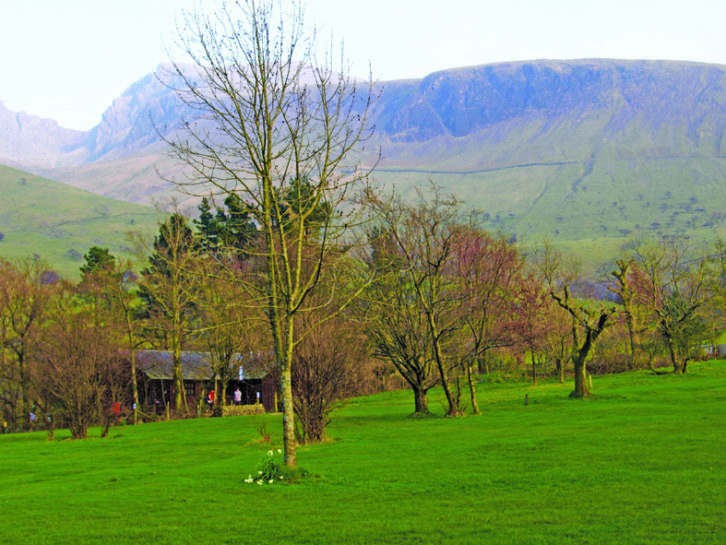
- Wasdale Head, Gosforth, CA20 1EX
- Tel 01946 726 220
- Web nationaltrust.org.uk
- Prices From £10 per night
Long Beach, New Forest
- Fritham, Hampshire, SO43 7HH
- Tel 02380 812 740
- Web campingintheforest.co.uk
- Prices From £13.50 per night for 2 adults
Barn Owl Campsite
- Felsham Road, Bury St Edmunds, IP30 0SG
- Tel 01449 973 7274
- Web pitchup.com
- Prices From £15 per night
Gwern Gof Uchaf Campsite
- Capel Curig, Betws-y-Coed, Snowdonia, LL24 0EU
- Tel 01690 720 294
- Web tryfanwales.co.uk
- Prices From £10 per night
Stavel Newydd Caravan and Motorhome Club Site
- Llanrhidian, Swansea, SA3 1EE
- Web camc.com
- Prices From £7 per night
Hillfort Tipis
- Penparc, Pencaer, Goodwick, Dyfed, SA64 0JQ
- Tel 01348 891 497
- Web hillfort-tipis.co.uk
- Prices From £22 per night for 2 people
Tucker’s Grave Inn
- Faulkland, Radstock, Somerset, BA3 5XF
- Tel 07976 897 743
- Web tuckersgraveinn.co.uk
- Prices From £11.78 per night
Gwern Gof Isaf Campsite
- Capel Curig, Betws-y-Coed, Snowdonia, LL24 0EU
- Tel 01690 720 276
- Web gwerngofisaf.co.uk
- Prices From £12 per night
Cnip Grazing, Outer Hebrides
- Kneep, Isle of Lewis, Outer Hebrides, HS2 9HS
- Tel 01851 672 332
- Web visitouterhebrides.co.uk
- Prices From £6 per night
Cheltenham Racecourse C&MC Site
- Prestbury Park, Cheltenham, Gloucestershire, GL50 4SH
- Tel 01242 523 102
- Web camc.com
- Prices From £7.50 per night
Fontmill Farm Campsite
- North Street, Hellingly, East Sussex, BN27 4EB
- Tel 01435 813 930
- Web fontmills.co.uk
- Prices From £20 per nigh for 2 adults
Steamer Quay C&MC Site
- Steamer Quay Road, Totnes, TQ9 5AL
- Tel 01803 862 739
- Web camc.com
- Prices From £7.10 per night
Exeter Racecourse C&MC Site
- Kennford, Exeter, EX6 7XS
- Tel 01392 832 107
- Web camc.com
- Prices From £6.40 per night
Matley Wood, New Forest
- Beaulieu Road, Lyndhurst, SO43 7FZ
- Tel 024 7642 3008
- Web campingintheforest.co.uk
- Prices From £11.20 per night for 2 adults
Nampara Campsite
- Kuggar, Cornwall, TR12 7LY
- Tel 01326 290 040
- Web namparracampsite.co.uk
- Prices From £14 per night for 2 adults
Altnaharra Caravan & Motorhome Club Site
- Altanaharra, Lairg, IV27 4UE
- Tel 01549 411 226
- Web camc.com
- Prices From £7 per night
Ivy Bank Campsite
- Ripon, North Yorkshire, HG4 3SS
- Tel 07716 422 453
- Web ivybankcampsite.co.uk
- Prices From £15 per night
Broadstone Park
- Staunton Road, Coleford, GL16 8PB
- Tel 07980 744 163
- Web broadstonefisheries.com
- Prices From £15 per night
Middleton Top CS
- Wirksworth, DE4 4LS
- Web campingandcaravanningclub.co.uk
- Prices From £10 per night
If you liked this…READ THESE:
Guide to motorhome solar panels
Spotlight on motorhome lighting
If you’ve enjoyed reading this article, why not get the latest news, reviews and features delivered direct to your door or inbox every month. Take advantage of our brilliant Practical Motorhome magazine SUBSCRIBERS’ OFFER and SIGN UP TO OUR NEWSLETTER for regular weekly updates on all things motorhome related.
There's a skill to off-gridding, which took a little while to develop, but the effort is worth it, as I've stayed on some sensational facility-free sites over the years
